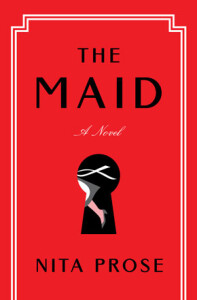
NOTE: There may be some spoilers in this review.
My first reaction to my local book club’s choice for this month was that it was a shoddy knockoff version of the delightful Japanese bestseller Convenience Store Woman. Like that subtle, smart novel, Prose’s protagonist is a young woman apparently on the autism spectrum who works in a menial job and loves it. Unfortunately, The Maid doesn’t measure up.
Molly Gray works as a chambermaid in a five-star hotel where she enjoys restoring each room to “a state of perfection.” Less enjoyable is the disdain with which most of her colleagues treat her—referring to her a weirdo, a robot, a Roomba—though not to her face. Still, she calls on the platitudes and proverbs she learned from her gram, recently deceased, to keep her world in order. Then one day she enters a room to clean it and finds the guest staying in it dead on the bed.
Billed as a cosy mystery, the book fails to be either. True, there is a death and cups of tea, but there is no intrepid sleuth tracking down the killer. There are no clues to follow, no investigation. Instead, the story limps through a threadbare plot, every step of it embarrassingly obvious. There are a few gratuitous “twists” at the very end which come across as cheap tricks because they are not integrated with the plot at all.
Not only is the plot childishly simple, but the language is in the middle grade range (appropriate for age 8-12), often even simpler than that. And that gets to the worst aspect of the book. Since it’s quite obvious to the reader what’s going on, the plot is not the driving force in the book. Neither is the setting, which is barely sketched in. The people in the story are caricatures and stereotypes, either all good or all bad, so nothing there to keep the reader going. The only thing left is Molly herself.
Yes, the force propelling the story is the reader’s amusement as Molly constantly misinterprets what’s obvious to all of us neurotypical folks and responds with prim childish speeches. Making fun of neurodivergent people is a bizarre—and repulsive—choice for the basis of a book. I’m aghast that so many people seem to think this is just great, and that the book has won multiple awards, achieved bestseller status, and will be made into a film.
Making Molly be so childish and naïve seems like the author knows nothing about autism. We talk about cultural appropriation in literature. If a neurotypical author is going to write a first-person novel in the voice of a neurodivergent person, they ought to at least be knowledgeable about the condition. There’s also the way Juan Manuel, who works in the hotel’s kitchen, is presented as naive, unintelligent and helpless, summoning the most despicable stereotypes about immigrants and Mexicans. The police too are shown as bumbling and cruel.
In addition to the above concerns, there are gaping holes in the logic of this story, For example, Molly bounces back and forth from clueless to astute and back again. She tells us about her condition, but sometimes doesn’t show it in her behaviour. Also, no police detective arresting a young woman in her pajamas, would cart her off to jail without enabling her to get dressed. Here, Molly even has to appear in court in her jail-begrimed pajamas, like that would actually happen.
Maids do not trundle their carts through the lobbies of five-star hotels or leave them outside the door to the bar. Nefarious boyfriends are not able to clean out a person’s entire savings account at an ATM in one fell swoop; there are limits on how much you can take out at a time. Plus, how is it that criminals can be running a drug ring in a fancy hotel without anyone noticing? Where are the security people?
Most of all, how is it that no one, from Molly’s childhood teachers to her co-workers to anyone on the police force, recognises that she is neurodivergent?
I am baffled by the praise heaped on this book. As I read it, I alternated between boredom and outrage. Of course, even though it’s a first novel, the author is a longtime editor and, at the time it was published, vice president and editorial director at Simon & Schuster, so she knows a few people.
There are some cute things in the story, like the devotion of Molly and her gram to the Olive Garden and the old tv Show Columbo. But that’s not enough to make up for the story’s weaknesses.
What story have you read with a neurodivergent narrator? What did you think of it?